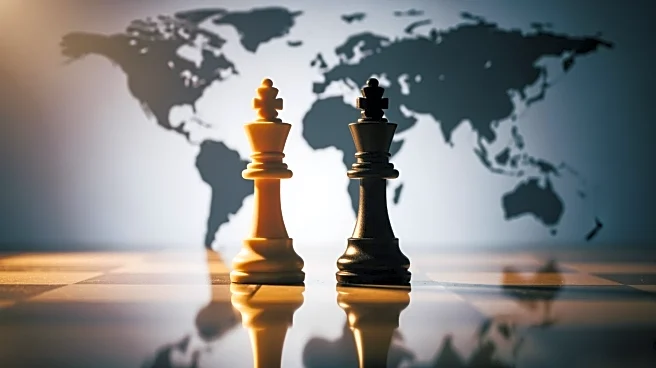What's Happening?
President Donald Trump announced plans to meet Russian President Vladimir Putin in Budapest to discuss ending the ongoing war in Ukraine. This announcement follows a productive call between the two leaders,
where Trump expressed optimism about achieving a diplomatic breakthrough. The meeting is set to occur within two weeks, with Hungarian Prime Minister Viktor Orban facilitating the discussions. The summit aims to address the conflict between Russia and Ukraine, which has persisted since Russia's full-scale invasion in February 2022. President Volodymyr Zelensky of Ukraine is currently in Washington, seeking U.S. support to pressure Russia into negotiations and requesting Tomahawk missiles to bolster Ukraine's defense capabilities. Trump, however, has shown skepticism about selling these missiles, citing domestic needs.
Why It's Important?
The planned summit between President Trump and President Putin holds significant implications for international diplomacy and the ongoing conflict in Ukraine. A successful negotiation could lead to a reduction in hostilities and potentially end the war, which has resulted in substantial casualties and territorial disputes. The meeting also highlights the complex geopolitical dynamics, with the U.S. playing a crucial role in influencing the outcome. The potential sale of Tomahawk missiles to Ukraine could escalate tensions, but it also serves as a bargaining tool to pressure Russia into peace talks. The summit's outcome could impact U.S.-Russia relations, European security, and the global energy market, given Russia's strategic use of trade incentives.
What's Next?
The upcoming summit in Budapest will be a critical moment for diplomatic efforts to resolve the Ukraine conflict. Secretary of State Marco Rubio is set to meet Russian Foreign Minister Sergei Lavrov to lay the groundwork for the discussions. Meanwhile, U.S. congressional leaders are considering legislation to strengthen sanctions against Russia, which could influence the negotiations. The legislation, led by Senators Lindsey Graham and Richard Blumenthal, proposes significant tariffs on Russian energy exports. The success of the summit could render these measures unnecessary, but failure to reach an agreement may lead to increased economic pressure on Russia. The international community will closely monitor the summit's developments and its impact on regional stability.
Beyond the Headlines
The Trump-Putin summit could have deeper implications beyond immediate diplomatic outcomes. It may affect the balance of power in Eastern Europe and influence future U.S. foreign policy strategies. The meeting also raises ethical questions about negotiating with a nation accused of aggression and human rights violations. Additionally, the summit could set a precedent for how the U.S. engages with other global conflicts, potentially reshaping its role as a mediator in international disputes. The involvement of Hungary, a Russia-friendly EU member, adds another layer of complexity to the geopolitical landscape.










